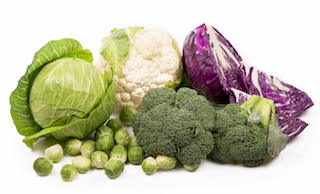Hypothyroidism Diet

As they say, every journey begins with a single step, and with that in mind, I’m going to focus on one thing; DIET.
THE BASICS
– Your thyroid needs specific nutrients to function, namely iodine, selenium, and zinc.
– Particular foods can increase requirements and potentially damage the thyroid.
– Particular foods can trigger an autoimmune response.
Let’s get started with number one;
What Nutrients Your Thyroid Needs.
IODINE – This is essential for the formation of thyroid hormones and its deficiency can lead to hypothyroidism and possibly an enlarged thyroid gland (goiter). While it seems that the answer may simply be to take iodine, in those who are diagnosed with Hashimoto’s, large doses of iodine have been observed to result in higher antibody counts and destruction of thyroid tissue! Lower doses in balance with other minerals have proven to be more successful in improving outcomes.
SELENIUM – Selenium helps protect the thyroid gland from free radicals and is required for the conversion of thyroid hormones. It is essential to enable iodine to perform its function properly without causing damage. Selenium is toxic in high doses, so supplement only under the guidance of a trained practitioner, otherwise look for food sources such as turkey, chicken, eggs and brazil nuts.
ZINC – Zinc is required for so many cellular functions and not surprisingly it is also involved in the functioning of the enzyme required for thyroid hormone conversion. Food sources of zinc can be found in poultry, chickpeas, seeds, beans and nuts.
TYROSINE – Tyrosine is amino acid that acts as a precursor for the formation of thyroid hormones and is often deficient in hypothyroid patients.
Food sources of tyrosine can be found in fish, chicken, seeds, nuts, egg, turkey and pork.
Foods That Decrease Iodine Uptake:
Here we’re specifically referring to goitrogens which have been shown to reduce the conversion of thyroid hormones by decreasing the uptake of iodine by the thyroid gland. Cooking goitrogenic foods will reduce their goitrogenic content by two thirds on average. Goitrogens are commonly found in cruciferous vegetables like cabbage, kale, bok choy, broccoli, and cauliflower as well as soy, tofu, sweet potatoes and millet. It’s never advisable to eat these raw especially when pregnant as iodine is necessary to ensure adequate fetal development.
Foods That Trigger Autoimmune Responses:
This is a very personal area, for a lot of Hashimoto patients it’s gluten that sends them into a spiral, for others, it’s the nightshade family, eggs, or dairy. A good place to start seems to be to focus on removing processed foods that offer little nutritional value and perform an elimination and reintroduction protocol. Meaning, eliminate the usual suspects an introduce them one by one whilst monitoring your response over a period of a few weeks.
Be aware that if you chose to go gluten-free, many gluten-free products are simply made from rice flour, which is essentially a refined carbohydrate. Refined carbohydrates are detrimental to blood glucose control, an issue that is very common for Hypothyroid patients. Elimination protocols are a complex process that are usually undertaken with the guidance of a health professional to ensure they are staged correctly. Initial stages are focused around removing potential triggers to allow the body to repair itself and better absorb the nutrients it needs to function so best to start that journey by keeping a diet diary. As a naturopath, I find when consulting with patients this information is most useful and fast tracks the process.
If you have any quick questions or need general advice you may email me at email hidden; JavaScript is required. Please be aware I cannot offer a comprehensive consultation over email or phone but I am happy to answer quick simple questions.
If you would like a comprehensive health evaluation covering and assessing your medical history, blood test results, dietary needs and lifestyle habits that may be impacting your thyroid, please make an appointment and allow for an hour. I offer telehealth (zoom) or face to face consults.


